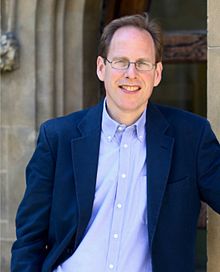Simon Baron-Cohen
Simon Baron-Cohen (* 15. August 1958 ) is a British clinical psychologist and director of the Autism Research Center (ARC) in Cambridge ( UK ).
Life
Baron-Cohen studied medicine at New College , Oxford from 1978 to 1981 . From 1982 to 1985 he continued his studies at University College London , where he received his doctorate in clinical psychology . Today he is a professor of developmental psychopathology in the departments of psychiatry and experimental psychology at Trinity College of Cambridge University and director at the city's Center for Autism Studies.
Simon Baron-Cohen is the cousin of comedian Sacha Baron Cohen .
job
Baron-Cohen became known for his theory of the development of autism . His extreme male brain theory states that autistic people, caused by high testosterone levels in the womb, have an extremely male brain . He and his team examined the testosterone level in the womb of 58 pregnant women. Such children, who were exposed to increased testosterone levels in the womb, were distinguished from normal children by a smaller, but qualitatively higher vocabulary and less frequent eye contact. By the age of four these children were less socially developed. This is based on Baron-Cohen's empathizing-systemizing theory (ES) . This states that the brains of children who were exposed to elevated testosterone levels in the womb develop towards an improved ability to see patterns and analyze systems.
In addition, Baron-Cohen developed the autism quotient (AQ), which provides information about the extent of autism in adults.
Baron-Cohen used an experiment to examine innate gender differences: he showed newborns in an infant ward once the smiling face of a Cohen employee, and another time a mobile. The little boys looked at the mobile 52 percent of the time on average, compared to just 41 percent of the girls.
Baron-Cohen also sees empathy in adults as being more strongly associated with the group of women, while men, on the other hand, score more in what he calls the ability to systematize :
"The basic wiring of the ideally female brain favors empathic analyzes, while in the male brain the networks for understanding and building systems form the basis."
Publications (selection)
As an author
- Mind blindness. An essay on autism and theory of mind (Learning, Development and Conceptual change series). MIT-Press, Cambridge 1997, ISBN 0-262-52225-X .
-
Different from day one. The female and male brain . Patmos 2004, ISBN 978-3530421743 .
- Paperback: Women think differently, so do men. How sex gets into the brain . Heyne, Munich 2009, ISBN 978-3453601154 .
- Original title: The Essential Difference. Men, women and the extreme male brain . Penguin / Basic Books, 2003, ISBN 978-0713996715 .
- Autism and Asperger Syndrome. The facts . OUP, Oxford 2008, ISBN 0-19-262327-3 .
- Zero degrees of empathy. The new theory of human cruelty . Allen Lane, London 2011, ISBN 978-0-713-99791-0 .
As editor
- Understanding other minds. Perspectives from autism OUP, Oxford 1997, ISBN 0-19-262056-8 .
Individual evidence
- ↑ http://www.bdwi.de/forum/archiv/archiv/97753.html
- ↑ Birgit Herden:Inheritance and upbringing. In: Die Zeit , No. 27 of June 28, 2007.
- ^ The Essential Difference: Men, Women and the Extreme Male Brain. Penguin (June 7, 2012)
Web links
- Baron-Cohen on the ARC website
- Baron-Cohen on the Cambridge University website
- SPIEGEL conversation: "Women think differently" from November 1, 2003
| personal data | |
|---|---|
| SURNAME | Baron-Cohen, Simon |
| BRIEF DESCRIPTION | British psychologist |
| DATE OF BIRTH | 15th August 1958 |
